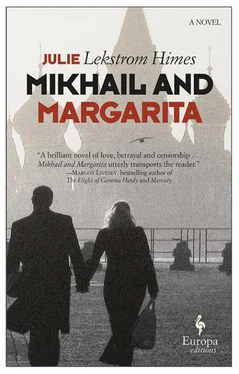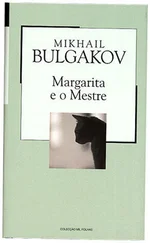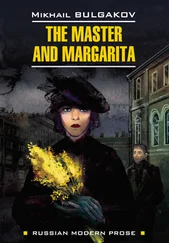“Never fear, Bulgakov! They will come for you too.”
He clattered down the stairs, fleeing her. Only silence followed. The entry hall was cool and grey in the early light as though part of a different world. He looked at the pages.
A shopping list, a letter from the housing committee chairman, a memorandum from the Writers Union. He’d saved nothing. He struggled to remember the line taken by the flames.
He saw Mandelstam in a grey-green cell under the interrogator’s light. No one really wants you to write. Not even the ones who love you most. Did you not see how easily she’d burned them?
Margarita appeared from around the stairway’s landing. She descended to the bottom step. She carried a modest collection of loose pages. She measured him. He was an uncertain ally.
The fabric under her arm was dark with perspiration.
“I have to go back.” She held out the pages. “Nadya moves quickly. She may realize I’m not as helpful as she thinks.”
He took them and thumbed through. Stanzas flashed past. Phrases of new music. Something fresh and beating had been pulled from the wreckage. A life had been saved. It felt like it was his.
His eyes took to that darker place under her sleeve again. Somewhere above it floated shoulders and a head, but he stopped there. Here was enough. He didn’t care whose shirt it was.
It was rumored that the Writers’ Union would formally protest Mandelstam’s arrest. A meeting was scheduled, then postponed—once because of a newish and unexpected work holiday, then again when the acting chairman developed a head cold. Bulgakov had not returned to Mandelstam’s apartment though he made inquiries around the Union. The exchange of information was generally the same. Most lamented the event. All secretly desired to know what Mandelstam had done to bring such disaster upon himself, though only a few asked, and then with varying degrees of delicacy. It was clear to Bulgakov that they’d not heard of the poem. Of course those who knew would not be asking questions. He heard that Nadya had met with Bukharin, but reports of this differed. His own play had been delayed by additional edits that Stanislawski had requested. The director seemed to be taking arguably random trips to Crimea, and with these and various other excuses Bulgakov worked on the changes alone and worried. Occasionally he walked past the DRAMALIT house. He counted the frames of glass that made up the third-floor windows, guessing at those which would be Mandelstam’s. Generally it was at night and their panes were dark. He shrank from risking Nadya’s vitriol. Several weeks later, an unsigned note appeared in his postal box; it gave only a date and a time. There was something about the script; he guessed it was a woman’s. Was it Margarita’s? It was written on the back of a line of verse that was in Mandelstam’s hand. He could envision the masculine arm that had made those strokes; he could hear the words shaped by his voice. It was a reminder of his loss and an inducement to attend. He studied the other side of it as well. It was hope that she might be there too.
Bulgakov was modestly late and yet the second to arrive. The conference room was at the top of the stairs leading from the foyer of the Union’s first floor. Sounds from the kitchen funneled up through the stairwell and into the room, lending an impression of greater activity and purpose than it deserved. Its only other occupant was the Chairman’s assistant who sat mid-length along the oblong table, writing into what appeared to be a composition book. The room’s window casements had been left open and were filled with the streetlight’s amber color; drab and stained curtains hung through them and over the outside sills. Despite this, the temperature within was stifling.
“The Enhancement Committee meeting has been moved to Room 24,” said the assistant. He gestured with his free hand, over his head.
“Has Berlioz returned?” said Bulgakov.
“He extended his holiday by a month.” The assistant appeared neither dismayed nor surprised by this.
“And the Acting Chair?”
He repeated his earlier gesture, then went back to his writing. Bulgakov settled into a window ledge as a makeshift seat. It seemed safer somehow; his escape route, no matter how precarious, at his back.
Over the course of the next three quarters of an hour, a half dozen others joined them. Some took refuge in the window casings as he did; others sat somewhat uncomfortably around the table. One asked another the time, then, after receiving an answer, checked his own watch. Bulgakov was about to leave when Margarita came in. Her eyes flicked over him and he was left with the immediate impression that despite whatever secret they might share from that other morning, she was skeptical of his motives, perhaps wondering herself why she’d bothered to deliver the note.
The acting Chairman entered: Leonid Beskudnikov, an essayist who specialized in historical pieces. He directed his first question to the rightful Chairman’s secretary, asking if there was yet any word of the other’s return. The reply was the same as before and the essayist looked visibly uncomfortable. “What are you doing?” he asked sharply of the secretary, as he appeared to be writing with great energy.
“I am minuting your meeting,” he said. Beskudnikov’s discomfort went to the extreme. “I don’t know if you can call it my meeting,” he said. “This seems more of an informal gathering. Quite informal.” He searched the room for agreement.
The novelist Poprikhen, an amply sized man, leaned back in his chair. He appeared neither unhappy nor frightened. “Do we know exactly what Mandelstam did?” he asked the general audience. Others leaned in, hopeful of gossip. “Maybe he deserved it,” he said. “I think that should first be established.”
“Seems like it’s always the poets,” sighed Natasha Lukinishna, a diminutive woman with round glasses, who wrote naval stories under the pen name Bosun George. “What else can they write about except how unhappy they are with the world?”
Poprikhen wagged his finger at the others around the table. “Not everyone is a saint and it’s not always the wrong person who is detained. They must get it right sometimes.” With this, several began to talk simultaneously. Beskudnikov held up his hands but was ignored.
All conversation stopped. Nadya entered, accompanied by the poetess Anna Ahkmatova. Both were in black. Anna’s hands were clasped around Nadya’s arm, but she looked to be the one in need of support. Nadya’s posture, and in fact her entire demeanor was poker-like, while the otherwise stately Akhmatova was as bedraggled as a refugee. Beskudnikov rose, followed by the others; the women sat near the head of the table and the rest resumed their seats. Their effect was funereal. Everyone avoided making eye contact and struggled to find something to look at besides the two women. After a few moments, however, no one could unfasten their eyes from them. Nadya seemed impervious, staring into some unseen world.
“Have you had any news of your husband?” Beskudnikov asked.
She took an inordinate amount of time to answer. “I’ve heard nothing specific,” she said. Her fatigue was palpable. She told them she’d met with Bukharin three times. The third he’d asked what she knew, admitting he knew nothing more. The fourth he’d refused to see her. Someone with connections to the Secret Police asked her the rank of the agent who’d searched their apartment; evidently the higher the rank, the more serious the case. Another had made inquiries on her behalf, then was advised not to get involved. “I wait in line,” she said. “I leave packages daily—I have no idea if they make it into his hands. I have no idea.”
Читать дальше












